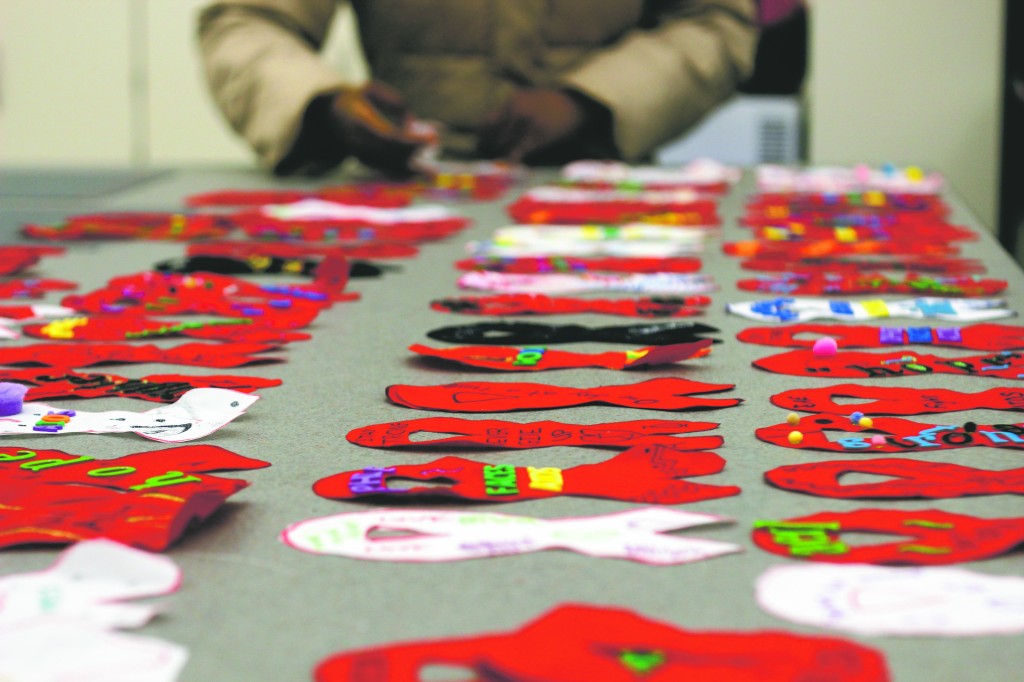
Real Education About College Health (REACH) shed light on the reality of HIV and AIDS in college while decorating an awareness quilt.
Jazell Johnson, a health educator at the Decker Student Health Services Center, organized “Face AIDS with REACH” with the help of REACH interns and her graduate assistant, Alaina Ryan.
“The purpose of the quilt is to have a visual display of support for those who are affected or know of someone who is affected by HIV/AIDS,” Johnson wrote in an email.
Students, along with REACH interns, decorated red-cloth ribbons. The interns then took the cloth ribbons and trimmed the outside edges to place them on the quilt.
REACH aimed to increase awareness about HIV and AIDS and provide a visual for support for HIV/AIDS patients on and off campus. REACH also addressed misconceptions and stigma related to AIDS.
“These misconceptions are that it’s not going to happen to [college students], and they don’t necessarily know all the possible ways they could contract HIV,” Johnson wrote. “So they may not be as cautious as they could be.”
Students participating in the event said they were aware of the stigma associated with AIDS and its relation to sexual promiscuity.
“I think it’s a long-standing belief that AIDS is something that shouldn’t be talked about,” said Jeremy Poserio, a senior majoring in biochemistry. “I think because REACH is doing outreach, it makes it more accessible and easier to learn about.”
REACH discussed the issue of sexual promiscuity in relation to AIDS, as well as taking protective measures against sexually transmitted diseases.
“It’s college and a lot of people are sleeping around,” said Vanessa Wilcox, a sophomore majoring in linguistics. “It’s the truth, and obviously people need to be aware of what’s out there and the risks of being sexually active.”
REACH advocated for using a condom whenever having sex and regular HIV testing for all college students.
“I think it’s important for them to realize HIV is an issue and for them to take charge of their sexual health,” Ryan said.
Decker Student Health Services provides testing on campus, and the Broome County Health Department, Planned Parenthood in Walton, N.Y., and Oneonta Community Health Center all have STD tests for students as well.
Testing can be confidential, meaning that the person’s name is used but kept confidential under federal law, or anonymous, meaning that no record of the person is kept. Despite these methods of discretion, many students are not tested.
“I think a lot of students don’t realize HIV is a prevalent issue on college campuses,” said Ryan, a graduate student studying student affairs administration. “Only about 25 percent of students get tested for HIV, yet there are statistics that show that 20- to 25-year-olds are most likely to get HIV.”
Kelly Li, an undergraduate REACH intern and a junior majoring in biochemistry, discussed why the percentage of HIV testing was not higher.
“I think people believe that it can’t happen to them or if they are suspicious, they might be ashamed to get tested,” Li said.
REACH worked with Residential Life to have a quilting session in each residential community. The last stop was supposed to be at the College-in-the-Woods Commons, but because of Woods Jam, the event was moved to the Tillman Lobby.
“In the past we haven’t been able to be as present on campus regarding world AIDS and HIV, so we decided to make it a campus wide initiative,” Johnson wrote.
About 50 to 60 people at Hinman College made ribbons for the quilt. Mountainview College, Newing College and Dickinson Community also participated.
REACH also focused on college students as agents of change who will further AIDS awareness and prevention outside of Binghamton.
“College students are from cities, they’re from New York, they’re from all over, so they can take this education back with them,” Johnson wrote.


